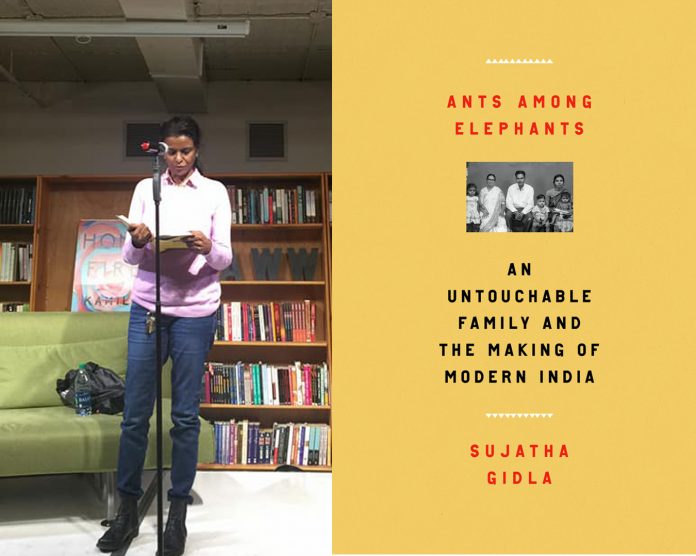By Valli Karunakaran, TwoCircles.net
New York City, March 10, 2018 — Sujatha Gidla was among the authors invited to speak at #Breaking Caste, a literary event organized by Asian American Writer’s Workshop and Equality Labs.
Gidla, author of Ants among Elephants: An Untouchable Family And The Making Of Modern India, a memoir on her family’s lives as Dalits in India and America, read to an audience of over 50 attendees at the Asian American Writer’s Workshop space in Manhattan.
She read a section of her book describing the events around a wedding in the Dalit ghetto where the pig for the wedding feast was being prepared. The section is an exploration of the condition of the pig, the excitement surrounding its preparation, the stigma attached to its consumption, and the ways that the stigma was both entertained and rejected by the community.
Gidla narrated aloud in almost the same forthright tone of her writing. “The cheapest meat for the cheapest man on earth,” she ended, to a rapt audience breaking out in applause.
A discussion was moderated by the author of “Coolie Woman”, Gaiutra Bahadur. Question and answer sessions followed.
During Q&A, Gidla brought up the issue of publishing networks, in general, being plagued by the lack of Dalit representation. “No Dalit has really been involved or participated in the post-writing processes of this book,” she said “No one in the production, the distribution, the advertising, reviewing, or even the translation or audio book-making processes. I looked for audio narrator from Dalit, Tribal, Muslim, or Black American background, but couldn’t find anyone. It is not that the publisher was a casteist or racist, but the narration required a special training and I couldn’t find anyone with the requisite training who would have been suitable.”
In many ways, Gidla’s experiences reveal how removed Dalits, Tribals, and other oppressed people are from publishing circles that are disproportionately dominated by “upper”-Caste voices.
For example, Gidla had strong words for one reviewer of her book – Tunku Varadarajan, who wrote his review for The Wall Street Journal. “This person calls himself a “Born Again Brahmin”. He’s really a casteist. He took my book as an opportunity to get his writing into the Wall Street Journal. That’s all it was.”
Gidla explained why she was so infuriated by this review. “ In it, he writes, “She (Gidla) may or may not know, but Sujatha, in Sanskrit means “born in a good caste.” “
Gidla clarifies. “First and foremost, Sujatha in Sanskrit does not mean “born in good caste.” Sujatha is a secular name, not a Hindu name. It means “Well-born” – “Su” meaning “good/well” and “Jatha” meaning “born of“. And he didn’t just stop there – he also implies that it was maybe unfortunate that I “ended up” as a conductor. This just shows his lack of dignity for labor! In fact, I won’t hesitate to say that I thought to myself – “This Brahmin Bastard!”, when I read that review.”
It is worth noting that Gidla herself did not take the traditional routes to the publishing of her book. Ants Among Elephants is her first book. She has never undergone training to be a professional writer. Her own incredible research on her family and the passion with which she approached the memories of her people has resulted in an outstanding piece of literary and historical work. In fact, she took over the South Asian literary scene quite unexpectedly. “To be honest – not everyone is interested in climbing social ladders and in the same old boring conventional ways,” she says.
Gidla also shared space with Neel Mukherjee, author of “A State of Freedom”. When asked by an audience member how Mukherjee, a Brahmin, wrote into his book several “low” Caste, working-class people’s stories, he said he didn’t believe in the idea that only one who is from a particular community could speak the stories of that community. He said he rejected that kind of “identitarianism”.
After the discussions, Gidla signed her book and met with several enamored readers one-on-one.


